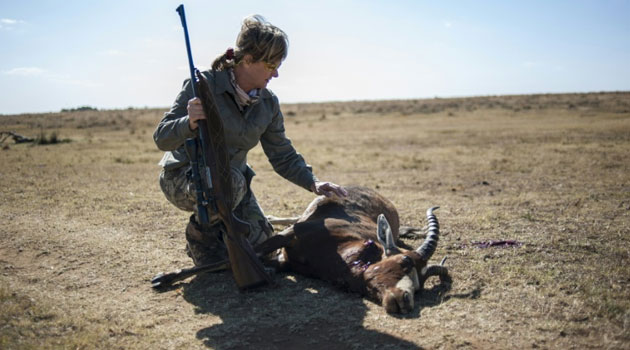
Adri Kitshoff, chief executive officer of Professional Hunters’ Association of South Africa (PHASA), kneels by an antelope she hunted at the Iwamanzi Game Reserve in Koster on June 6, 2015/afp
The hunter rests her chin on the gun and closes her eyes in a silent prayer of thanks that the animal did not suffer.
Kitshoff, 57, has shot many such animals before but, as she goes to the corpse, her hands begin to tremble.
“If I would ever become blasé when I’ve taken an animal, that day would be my last day hunting,” said Kitshoff, stroking the dead blesbok’s white face and brown coat.
Kitshoff, director of PHASA, the professional hunters association of South Africa, knows that not everyone shares her passion for hunting.
Yet she is determined to prove that hunters in South Africa are an integral part of conservation efforts.
Her argument is a simple one — hunters come to PHASA from all over the world willing to pay tens of thousands of dollars to track and kill buffalo, lion and elephants in African countries where trophy hunting is legal.
These hunters pay big money in order to hunt.
A 20-day lion hunt, for example, can cost 80,000 euros ($90,000) to 130,000 euros.
Some of the money goes back into the reserves, in what hunters describe as a virtuous cycle that enables people to maintain large tracts of land where animals can roam free.
“If practised in a sustainable manner — that is to say by not killing more animals than nature creates — hunting protects wildlife and the environment,” says Hermann Meyeridricks, the president of PHASA.
“Without sustainable use, there is no incentive to preserve vast natural areas, not for landowners or for the people.”
– A single shot –
In South Africa, hunting is only allowed on private reserves, not in national parks like the Kruger.
On a cool, sunny afternoon in June, Kitshoff spent hours tracking different animals in the Iwamanzi reserve in North West Province.
Her code of ethics dictates that she does not shoot out of the Land Cruiser as it crosses the savannah.
As a result, several potential prey have fled before Kitshoff succeeds in approaching one close enough on foot.








































